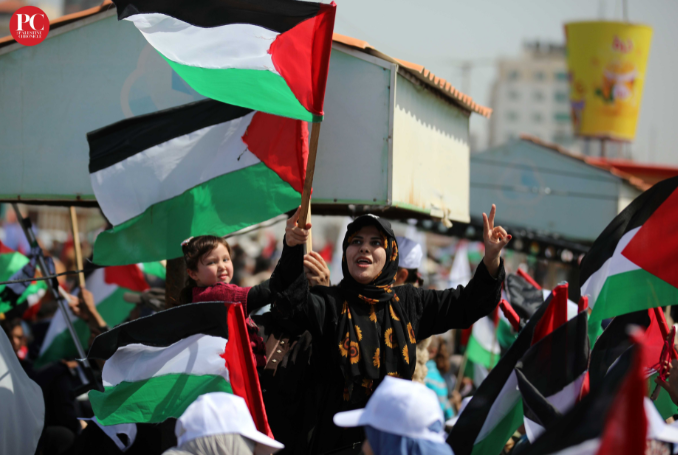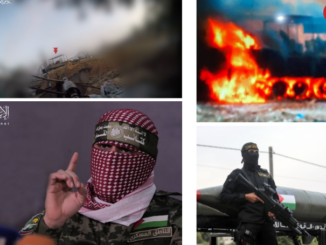
Palestinians are fighting for a future, to finally be rid of the stench of Israeli colonialism and military occupation.
Language is a loaded weapon used by the powerful to incite and maintain advantages during conflicts and wars. No one understood this better than George Orwell when he wrote in 1946, “Political language…is designed to make lies sound truthful and murder respectable, and to give an appearance of solidity to pure wind.”
The “war of words” is as important as the battle itself. Propaganda is used to rally the troops, manage public perceptions, and garner support. The maxim that “in war, truth is the first casualty,” accurately renders the corporate media’s weighted coverage of the October 7 attack by Hamas against the Israeli occupier.
Israel has firmly embedded the myth that it is a democratic, brave, vulnerable nation into the body politic of the United States. In their current war against the Palestinians, Tel Aviv has made sure to control the narrative and silence dissenting voices. With the corporate media, they have established who matters, Israel, and who does not, the Palestinians.
The first casualties of the disinformation campaign have been the use of the words “war” and “conflict.” Oxford Dictionary defines war as “a state of armed conflict between different nations or states or different groups within a nation or state.” Conflict is defined (dictionary.com) as a “struggle or clash between opposing forces.”
It is a distortion to say that what we have been witnessing in Palestine is a war or a conflict. Both words imply a battle or struggle between equals or near equals, between two peoples with equal resources and claims.
As Israel conducts its aggression against the Palestinians in Gaza, the media continues to improperly frame the killing of the colonized by the Israeli colonizer as a war and/or conflict. CNN, MSNBC and National Public Radio, for example, have been using the promo,“Israel at War,” to entice viewers and listeners.
Tel Aviv has declared war on a political party, Hamas. The Gaza Strip—about the size of New Jersey— home to 2.3 million Palestinians, is not a nation or a state. It has been under Israeli military occupation and blockade and can best be described as an open-air prison.
Until they were able to breach Israel’s high-tech security wall separating Gaza from Israel, Palestinian fighters were trapped behind it, making a land battle with the Israeli army impossible. The sensor-equipped, 20-foot high steel and concrete wall equipped with remote-controlled weapon and radar systems, cameras and underground sensors is an “iron wall” around Gaza.
There is no symmetry between the overwhelming power of the Israeli war machine and Hamas. Hamas has no sizable army (estimates at 40,000 fighters) no air force or navy. It relies on missiles, drones and hand gliders. Israel has the fourth largest army in the world (169,500 active duty and 360,000 reservists), a fleet of US-made F-15, F-16 and F-35 fighter jets, 2,200 tanks, as well as sophisticated missile, drone and surveillance technology able to pinpoint and destroy individual targets.
Although Israel withdrew its settlements from Gaza in 2005, it maintains exclusive control over the air space, territorial waters, borders, electricity, water supply and the movement of people and goods in and out of Gaza. The Israeli regime imposed a crushing blockade of Gaza after Hamas won the majority of parliamentary seats in the democratic election of 2006.
The language employed to describe Israel collides with logic, reason and history. The Palestinian people of Gaza and the occupied West Bank who have been resisting 75 years of land theft, colonization, murder, torture, imprisonment without due process, collective punishment, manipulation, humiliation and genocide are called “militants” and “terrorists,” while Israeli occupying forces are called “defense” forces or commandos.
In the aftermath of October 7, Israeli politicians and warlords have promised Palestinians a collective punishment they will remember for generations to come. Knesset member Ariel Kallner, for example, called for a “Nakba that will overshadow the Nakba of 48,” referencing the massacres and expulsion of more than 750,000 Palestinians upon Israel’s establishment. Seventy-three percent of the people currently living in Gaza are the descendants of the first Nakba (catastrophe) of 1948, and have never forgotten it.
To legitimize its establishment of a Jewish state in Palestine, Israel has invented a new political logic and language. Its very creation story is mythical and its “statehood” is a violation of the United Nations Charter.
Israel invented its own reality when, without the approval of the U.N. Security Council, it declared independence on May 14, 1948. To legitimize their self-proclaimed state and to convince the world that it had international support, Zionist leaders manipulated the language of UN General Assembly Resolution 181, often called the partition plan.
Resolution 181 was just one among a number of recommendations offered by the General Assembly on how to confront the problem of the former British Mandate of Palestine. According to Chapter IV, Articles 10 and 12 of the 1945 UN Charter, the General Assembly “may make recommendations to the Security Council on matters,”—the Security Council never voted on Israeli statehood.
Following its self-declared statehood, Israel implemented its blueprint for the ethnic cleansing of Palestine known as Plan Dalet; formally adopted by Zionist and military leaders on 10 March 1948. To create a Jewish majority state in Palestine, the plan called for the systematic removal or “transfer” of Palestinians from their land. Military operations were drawn up to forcibly depopulate and destroy Palestinian population centers and to crush resistance.
In 1982, Israel’s carefully crafted narrative was sullied because of its brutal and indiscriminate bombing of Beirut in that year. To counter international criticism and recapture public opinion, the American Jewish Congress sponsored a conference in Jerusalem in 1983 with the goal of devising a strategy for reselling Israel. Israel’s Hasbara (explaining in Hebrew) Project was fashioned.
The project’s goal was to guarantee America’s unwavering support and to make criticism of Israel’s actions almost impossible. As witnessed today in Gaza, hasbara strategies have proven effective.
What is happening in Gaza is not new to the Zionist state. Israel has always existed by force. Its colonizing aims, begun in the 1900s, were laid out in the doctrine of men like Vladimir Jabotinsky (1880-1940), founder of Revisionist Zionism; the ideological cradle and policies of the current Likud Party. Jabotinsky’s ideas have shaped Israeli policies toward the Palestinians from the 1920s to the present.
In his book, “The Iron Wall,” Jabotinsky set out the Zionist rationale for carving a Jewish state out of Palestine through force. He wrote that an “iron wall” of Jewish military force—that all Zionists wanted—was the way to break Palestinian resolve and resistance to continued expansion. Jabotinsky also argued that morality and conscience could not dictate policy; that Zionists had to accept the fact that extremism and force were integral to accomplishing and maintaining Jewish statehood.
Jabotinsky did not see Zionism as the return of Jews to their spiritual homeland, but the embedding of Western “civilization” in the East. His pro-Western zeitgeist translated into building a Zionist state that would be permanently allied with European colonialism against all the Arabs in the eastern Mediterranean.
Some years later, in his memoirs, the late Israeli prime minister, Yitzhak Rabin, recalled what took place in July 1948 after Israeli forces captured the Palestinian city of Lydda, now known as Lod. He recalled a conversation he had with the country’s first prime minister, David Ben-Gurion, regarding the fate of more than 50,000 Palestinians living in Lydda and Ramleh; he wrote:
“We walked outside, Ben-Gurion accompanying us [Yigal] Allon repeated his question, ‘What is to be done with the Palestinian population? Ben-Gurion waved his hand in a gesture which said ‘Drive them out!….”
After obliterating the city, Rabin then signed an order forcing Palestinians to leave their homes in what became known as the notorious “Lydda Death March.”
Israel has never stopped driving Palestinians out of their homes and suppressing resisters. The attack by Hamas opened the door for Israel to crush what remains of any significant and organized Palestinian resistance—to move closer to fulfilling the plan that Jabotinsky, Ben-Gurion and other Zionists had argued for.
The regime’s current strategy is to force over l million Palestinians living in northern Gaza to abandon their homes and flee to the south. Once they have been “removed,” the early Zionist Plan Dalet to ethnically cleanse and control all of Palestine will inch closer to reality.
Palestinians are fighting for a future, to finally be rid of the stench of Israeli colonialism and military occupation. Conversely, Israel—the last remaining colonial power—is willing to do anything to hang onto its colonies.
And the United States concerned about the future of its military outpost in the heart of the Middle East, has given its approbation to the continued indiscriminate bombing, murder of Palestinians and to Israeli lawlessness, despite lip service to the contrary.
Israel’s supporters say the violence is caused by some inherent hatred of Jews, historical animosity or religion. The raison d’être, however, of Palestinian resistance is about reclaiming the land. The logic of Palestinian hostility can be found in the words of Zionist founder, Jabotinsky, “It is their homeland and they want to remain its sole owners.”
Years have come and gone, different Zionists have occupied the office of prime minister, but the language and ideology of Israel’s founders continues to frame the actions of every regime—“drive them out.”
Palestinians, however, remember the words of the late Nelson Mandela, South Africa’s first Black president and leader of its anti-apartheid movement, whose life resembles their own. Mandela recognized that there are some regimes that are so cruel and so unjust, that people have no alternative but to resist by force.
On a visit to the Middle East in 1999 he reaffirmed his support of the Palestinian struggle, saying: “Choose peace rather than confrontation, except in cases…when we cannot move forward. Then if the only alternative is violence, we will use violence.”

– Dr. M. Reza Behnam is a political scientist specializing in the history, politics and governments of the Middle East. He contributed this article to The Palestine Chronicle.








Never far behind the US in support for the last European settler-colonials. The UK Labour party leaders particularly a disgrace since 1917.